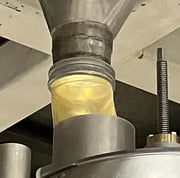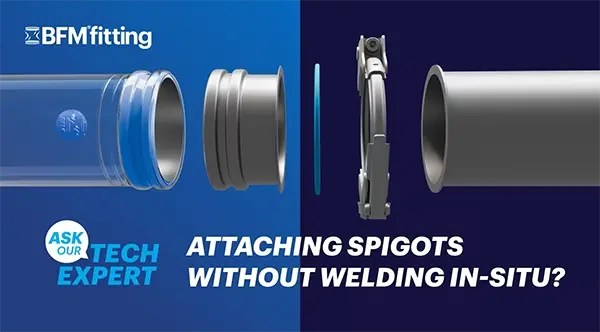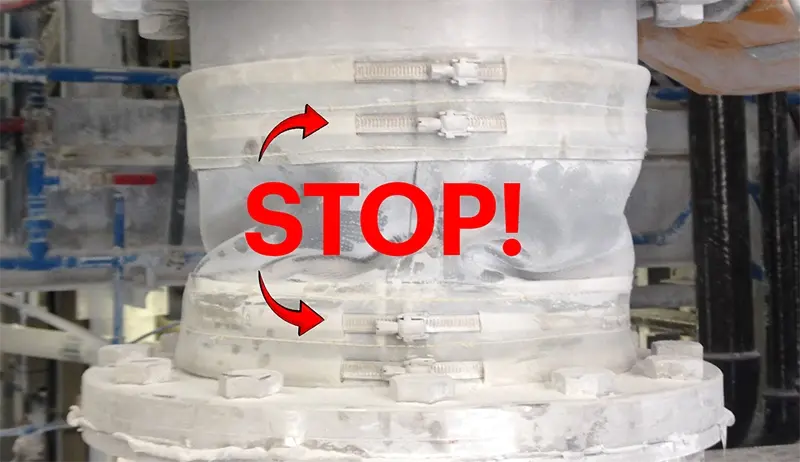As manufacturers today face increasing pressure to reassess their processes and equipment, one often overlooked yet essential component in production lines is the flexible connector—critical for transporting materials like powders between equipment. Though small in scale, their environmental impact is significant.
The Role of Flexible Connectors in Manufacturing
 Flexible connectors are indispensable in many manufacturing processes, connecting equipment such as hoppers, sifters, and dryers to ensure efficient material transfer. These connectors must be durable, flexible, and leak-proof. However, traditional flexible connectors, typically made from rubber or certain plastics, present significant environmental concerns due to their limited recyclability and short lifespan.
Flexible connectors are indispensable in many manufacturing processes, connecting equipment such as hoppers, sifters, and dryers to ensure efficient material transfer. These connectors must be durable, flexible, and leak-proof. However, traditional flexible connectors, typically made from rubber or certain plastics, present significant environmental concerns due to their limited recyclability and short lifespan.
The resulting waste and potential product loss or contamination can be substantial when a connector fails. Product leakage, especially in the form of powders, often occurs due to inefficient clamping systems or material defects. Beyond health and safety risks, cumulative product loss over time contributes to inefficiency and waste.
For example, according to a McKinsey report (2022), 16% of global food loss occurs during processing, which leads to higher carbon emissions and water use.
Sustainability Challenges in Flexible Connectors
Flexible connectors are often viewed as a disposable commodity, but that is often down to low quality design and production values. Here are the three main reasons many old-style flexible connection systems don’t meet the modern sustainability challenge:
 Material Composition: Many flexible connectors are made from non-recyclable materials, contributing to the growing issue of industrial waste. Rubber and certain hard plastics, common in connector manufacturing, are particularly problematic as they persist in landfills for decades.
Material Composition: Many flexible connectors are made from non-recyclable materials, contributing to the growing issue of industrial waste. Rubber and certain hard plastics, common in connector manufacturing, are particularly problematic as they persist in landfills for decades.- Short Lifespan: Frequent replacements due to wear and tear add to the waste burden. In high-demand environments, traditional connectors often require replacement within months, generating significant amounts of landfill waste over time.
- Operational Inefficiencies: Poorly designed or low-quality connectors can lead to product leakage or contamination. This not only increases material waste but also reduces overall production efficiency, leading to higher energy consumption and resource usage.
A More Sustainable Future with BFM® fitting
This is where the BFM® fitting flexible connector system has a distinct advantage that sets a new benchmark for sustainability in manufacturing.
Produced by BFM® Global, these BLUEBAND™ flexible connectors not only address many of the environmental issues associated with traditional sleeves, but also actively contribute to more sustainable processing operations.
 Focus on Waste Reduction from the Start
Focus on Waste Reduction from the Start
BFM® Global manufactures all its products in New Zealand, a country known for its stringent environmental standards.
The company’s waste reduction program optimizes raw material use, minimizing offcuts during production. Scraps like Seeflex polyurethane and excess steel are recycled whenever possible, reducing the environmental footprint of the manufacturing process.
BFM® Key Sustainability Advantages
While the BFM® fitting system has many impressive advantages over other connectors in terms of hygiene, safety and ease of installation, there are also three significant benefits in terms of sustainability:
- Eco-Friendly Materials: BFM® connectors are made from Seeflex polyurethane, a recyclable thermoplastic that is biodegradable under certain landfill conditions. This reduces reliance on non-recyclable materials like rubber, helping manufacturers meet sustainability goals.
- Exceptional Durability: Proven to last over 50 times longer than traditional connectors in some applications, BFM® connectors significantly reduce waste and replacement costs. Their longevity translates to fewer connectors in landfills and improved operational efficiency.
- Enhanced Production Efficiency: The airtight design of BFM® connectors virtually eliminates product leakage and contamination. This minimizes material waste, reduces cleanup costs, and enhances overall production efficiency.
The airtight seal of the BFM® fitting system ensures that every ounce of material stays within the production cycle, reducing cleanup and disposal costs.
Case Study: Richard Whittaker Ltd
 A leader in the blending, packing and supply industry for over 50 years, UK-based Richard Whittaker operates 24/7 with multiple production lines. The company’s frequent product changeovers—up to 10 times per week per line—posed significant challenges in terms of sustainability and efficiency.
A leader in the blending, packing and supply industry for over 50 years, UK-based Richard Whittaker operates 24/7 with multiple production lines. The company’s frequent product changeovers—up to 10 times per week per line—posed significant challenges in terms of sustainability and efficiency.
Their previous flexible connectors were “carrier bag-like” and secured with jubilee clips, leading to frequent product leakage and time-consuming replacements.
Each changeover took approximately 20 minutes per line, resulting in significant downtime. Additionally, these disposable connectors were non-recyclable and had to be replaced after every change, contributing to thousands of plastic connectors being disposed of annually.
 In 2015, Richard Whittaker Ltd sought a more sustainable solution and adopted the BFM® fitting system.
In 2015, Richard Whittaker Ltd sought a more sustainable solution and adopted the BFM® fitting system.
The snap-in technology of the BFM® connectors ensured a 100% dust-tight seal, eliminating product leakage and drastically reducing downtime.
Changeover times were cut by 75%, saving approximately 250 hours annually. Moreover, the durability of the Seeflex 040E connectors, which last up to three years, replaced the need for thousands of disposable connectors, significantly reducing waste.
The Long-Term Impact
The BFM® fitting system exemplifies how innovation can drive sustainability in manufacturing.
By addressing waste at every stage—from production to end-of-life disposal—and delivering unmatched durability and efficiency, these connectors represent a holistic approach to sustainability. The case of Richard Whittaker Ltd highlights the tangible benefits of adopting such solutions: reduced waste, improved efficiency, and a significantly lower environmental footprint.
For manufacturing facilities looking to reduce their environmental impact, the BFM® fitting system offers a clear path forward. It’s not just a smarter choice—it’s a greener one. By making thoughtful decisions about their equipment, manufacturers can take meaningful steps toward a more sustainable future.



